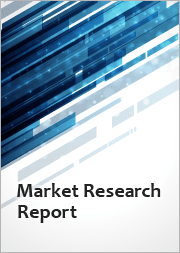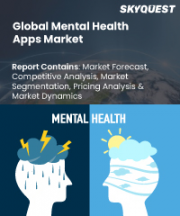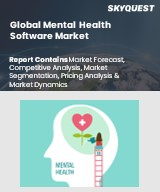
|
시장보고서
상품코드
1675727
신규 정신건강 디바이스 및 플랫폼 시장 : 유형별, 용도별, 지역별(2025-2033년)Emerging Mental Health Devices and Platforms Market Report by Type (Platforms, Devices), Application (Stress, Anxiety, Depression, Bipolar Disorder, and Others), and Region 2025-2033 |
||||||
세계의 신규 정신건강 디바이스·플랫폼 시장 규모는 2024년에 46억 달러에 달했습니다. 향후 IMARC Group은 2033년에는 258억 달러에 달하며, 2025-2033년에 20.19%의 성장률(CAGR)을 보일 것으로 예측하고 있습니다. 디지털 치료 및 원격 케어에 대한 수요 증가, 인공지능(AI) 주도 정신건강 솔루션의 이용률 상승, 대중 사이에서 다양한 정신건강 상태의 발생 증가는 시장을 추진하는 주요 요인의 일부입니다.
신흥 정신건강 기기 플랫폼은 원격 치료 및 인공지능(AI) 기반 자가 치료 툴을 제공하는 용도과 디지털 플랫폼을 광범위하게 포괄하고 있습니다. 이들은 진단을 촉진하고, 새로운 치료 수단을 제공하며, 환자 참여도를 높이고, 정신건강을 증진시켜 정신 헬스케어를 강화하는 것을 목표로 하고 있습니다. 이러한 툴은 지속적인 모니터링과 데이터 분석을 통해 정신건강 위기를 예방하기 위한 조기 발견과 개입을 돕습니다. 기존 치료법을 보완하고, 예정된 세션 외에도 지원을 확대할 수 있습니다. 또한 이용자가 자신의 정신건강을 관리하는 데 있으며, 임파워먼트와 자율성을 확보할 수 있도록 하여 회복에 대한 긍정적인 전망을 키울 수 있도록 합니다.
현재 대중들 사이에서 정신건강 상태와 도움 요청의 중요성에 대한 인식이 높아지면서 시장 성장에 박차를 가하고 있습니다. 이와 더불어, 전문적인 지원을 제공하고 정신건강을 모니터링하는 원격의료 및 가상 치료 서비스에 대한 수용이 증가하고 있는 것도 시장 성장에 기여하고 있습니다. 또한 정신건강 플랫폼에 게이미피케이션 기술을 통합하여 사용자의 참여와 동기를 높이고, 진행 상황을 추적하고, 목표를 설정하고, 적극적인 정신건강을 촉진하는 인터랙티브 활동에 참여할 수 있게 함으로써 시장 전망을 밝게 하고 있습니다. 시장 전망을 좋게 만들고 있습니다. 이 외에도 웨어러블 센서, 인공지능(AI) 알고리즘, 데이터 분석을 통합하여 보다 정확하고 개인화된 정신건강 개입을 가능하게 하는 것이 시장 성장을 지원하고 있습니다. 또한 개인에게 종합적인 솔루션을 제공하는 정신건강 스타트업 증가는 시장 성장을 가속하고 있습니다.
신흥 정신건강 디바이스 플랫폼 시장 동향/촉진요인:
디지털 치료와 원격 진료에 대한 수요 증가
현재 디지털 치료와 원격 진료에 대한 수요 증가는 성장하는 정신건강 기기 및 플랫폼 시장에 긍정적인 영향을 미치고 있습니다. 전통적인 대면 치료는 지역적 거리, 정신건강 전문가의 제한된 가용성, 도움을 요청하는 데 따르는 잠재적 편견과 같은 장벽이 종종 존재합니다. 그러나 디지털 치료 및 원격 치료 솔루션은 개인이 집에서 편안하고 사생활이 보장된 상태에서 정신건강 서비스와 지원을 받을 수 있는 유연성을 제공함으로써 이러한 장애물을 제거합니다. 이러한 접근성 향상은 더 많은 사람들이 필요한 도움을 요청할 수 있는 권한을 부여하여 조기 개입을 촉진하고 정신건강 상태의 악화를 예방할 수 있습니다.
AI를 활용한 정신건강 솔루션 활용 확대
AI를 활용한 정신건강 솔루션의 사용이 증가하면서 신흥 정신건강 기기 및 플랫폼 시장에 긍정적인 영향을 미치고 있으며, AI 기술의 발전은 정신건강 서비스 제공 방식에 혁명을 일으켜 치료의 효과성, 접근성, 개별화를 강화하고 있습니다. 강화되고 있습니다. 이러한 정신건강 솔루션의 패러다임 변화는 시장에 성장과 혁신을 위한 비옥한 토양을 조성하고, AI 기반 정신건강 기기에 자연 언어 처리(NLP)를 통합하여 개인 및 NLP 알고리즘은 인간의 언어를 이해하고 반응할 수 있으므로 보다 공감적이고 대화적인 대화를 할 수 있으며, 신뢰감과 친밀감을 형성하고, 정신건강 동반자와의 효과적인 소통을 가능하게 합니다. 이를 통해 신뢰와 친밀감이 형성되고, 개인은 AI 기반 플랫폼과 자신의 생각과 감정을 보다 편안하게 공유할 수 있게 됩니다.
각종 정신건강 질환 증가
다양한 정신건강 질환의 전 세계 유병률 증가는 신흥 정신건강 장비 플랫폼 시장의 성장에 기여하고 있습니다. 전 세계에서 정신건강 질환의 유병률이 증가함에 따라 이러한 문제를 해결할 수 있는 혁신적인 솔루션에 대한 수요가 증가하고 있습니다. 이러한 수요 증가는 시장 성장을 가속하고 정신건강 지원을 원하는 개인의 요구에 부응하는 최첨단 장비와 플랫폼을 개발 및 제공하는 기업에게 기회를 창출하고 있습니다. 또한 기술 발전은 시장 성장을 가속하는 데 매우 중요한 역할을 하고 있습니다. 스마트폰의 보급과 초고속 인터넷 접속은 정신건강 솔루션이 일상 생활에 통합되는 것을 촉진하고 있습니다. 모바일 애플리케이션과 웨어러블 기기 또한 자가 모니터링을 위한 보편적인 툴로 부상하고 있으며, 정신건강 상태에 대한 개인화된 인사이트를 제공하고 적극적인 자가 관리를 장려하고 있습니다.
목차
제1장 서문
제2장 조사 범위와 조사 방법
- 조사의 목적
- 이해관계자
- 데이터 소스
- 1차 정보
- 2차 정보
- 시장 추정
- 보텀업 어프로치
- 톱다운 어프로치
- 조사 방법
제3장 개요
제4장 서론
- 개요
- 주요 업계 동향
제5장 세계의 신규 정신건강 디바이스·플랫폼 시장
- 시장 개요
- 시장 실적
- COVID-19의 영향
- 시장 예측
제6장 시장 내역 : 유형별
- 플랫폼
- 디바이스
- 주요 부문
- EEG와 ECG 헤드 밴드
- 웨어러블 트래커
- 기타
- 주요 부문
제7장 시장 내역 : 용도별
- 스트레스
- 불안
- 우울증
- 조울증
- 기타
제8장 시장 내역 : 지역별
- 북미
- 미국
- 캐나다
- 아시아태평양
- 중국
- 일본
- 인도
- 한국
- 호주
- 인도네시아
- 기타
- 유럽
- 독일
- 프랑스
- 영국
- 이탈리아
- 스페인
- 러시아
- 기타
- 라틴아메리카
- 브라질
- 멕시코
- 기타
- 중동 및 아프리카
- 시장 내역 : 국가별
제9장 촉진요인·억제요인·기회
- 개요
- 촉진요인
- 억제요인
- 기회
제10장 밸류체인 분석
제11장 Porter's Five Forces 분석
- 개요
- 바이어의 교섭력
- 공급 기업의 교섭력
- 경쟁의 정도
- 신규 진출업체의 위협
- 대체품의 위협
제12장 가격 분석
제13장 경쟁 구도
- 시장 구조
- 주요 기업
- 주요 기업의 개요
- AbleTo Inc.
- Amelia Virtual Care
- Clarigent Corporation
- Electromedical Products International Inc
- Feel Therapeutics
- Flow Neuroscience
- Happify Inc.
- Headspace Inc.
- Pear Therapeutics, Inc.
- Quartet Health Inc.
- Talkspace Inc.
- Teladoc Health Inc.
- Woebot Labs, Inc.
The global emerging mental health devices and platforms market size reached USD 4.6 Billion in 2024. Looking forward, IMARC Group expects the market to reach USD 25.8 Billion by 2033, exhibiting a growth rate (CAGR) of 20.19% during 2025-2033. The growing demand for digital therapeutics and remote care, rising utilization of artificial intelligence (AI)-driven mental health solutions, and increasing occurrence of various mental health conditions among the masses are some of the major factors propelling the market.
Emerging mental health devices and platforms cover a broad spectrum of applications and digital platforms offering teletherapy and artificial intelligence (AI)-powered self-help tools. They are intended to enhance mental health care by facilitating diagnosis, providing new treatment avenues, improving patient engagement, and promoting mental wellness. They help in early detection and intervention to prevent mental health crises through continuous monitoring and data analysis. They can supplement traditional therapy, extending support beyond scheduled sessions. They enable users to gain a sense of empowerment and autonomy in managing their mental health, fostering a positive outlook on recovery.
At present, the increasing awareness about mental health conditions and the importance of seeking help among the masses is impelling the growth of the market. Besides this, the rising acceptance of telehealth and virtual care services providing professional help and monitoring mental health is contributing to the growth of the market. In addition, the growing integration of gamification techniques into mental health platforms to enhance engagement and motivation among users and enable them to track their progress, set goals, and participate in interactive activities that promote positive mental health is offering a favorable market outlook. Apart from this, the increasing integration of wearable sensors, artificial intelligence (AI) algorithms, and data analytics to enable more accurate and personalized mental health interventions is supporting the growth of the market. Additionally, the rising number of mental health startups offering comprehensive solutions to individuals is bolstering the growth of the market.
Emerging Mental Health Devices and Platforms Market Trends/Drivers:
Rising demand for digital therapeutics and remote care
At present, the rising demand for digital therapeutics and remote care is exerting a positive influence on the growing mental health devices and platforms market. Traditional in-person therapy sessions often present barriers, such as geographical distance, limited availability of mental health professionals, and potential stigma associated with seeking help. However, digital therapeutics and remote care solutions eliminate these hurdles by providing individuals with the flexibility to access mental health services and support from the comfort and privacy of their homes. This increased accessibility empowers more people to seek the help they need, promoting early intervention and potentially preventing the exacerbation of mental health conditions.
Increasing utilization of AI-driven mental health solutions
The increasing utilization of AI-driven mental health solutions is positively influencing the emerging mental health devices and platforms market. As AI technology is advancing, it is revolutionizing the way mental health services are delivered, enhancing the effectiveness, accessibility, and personalization of care. This paradigm shift in mental health solutions is creating a fertile ground for growth and innovation in the market, driving the development and adoption of cutting-edge devices and platforms. The incorporation of natural language processing (NLP) in AI-driven mental health devices is also facilitating effective communication between individuals and their digital mental health companions. NLP algorithms can understand and respond to human language, enabling a more empathetic and conversational interaction. This fosters a sense of trust and rapport, making individuals more comfortable sharing their thoughts and emotions with the AI-powered platform.
Growing occurrence of various mental health conditions
The increasing prevalence of various mental health conditions globally is contributing to the growth of the emerging mental health devices and platforms market. As the prevalence of mental health disorders is rising globally, there is a heightened demand for innovative solutions capable of addressing these challenges. This rise in demand is fueling the growth of the market, creating opportunities for companies to develop and offer cutting-edge devices and platforms that cater to the needs of individuals seeking mental health support. Moreover, advancements in technology are playing a pivotal role in propelling the growth of the market. The widespread adoption of smartphones and the accessibility of high-speed internet is facilitating the integration of mental health solutions into daily lives. Mobile applications and wearable devices are also emerging as popular tools for self-monitoring, offering personalized insights into mental health conditions and encouraging proactive self-care.
Emerging Mental Health Devices and Platforms Industry Segmentation:
Breakup by Type:
- Platforms
- Devices
- EEG and ECG head bands
- Wearable Trackers
- Others
Platforms dominate the market
Breakup by Application:
- Stress
- Anxiety
- Depression
- Bipolar Disorder
- Others
Depressions hold the largest share in the market
Breakup by Region:
- North America
- United States
- Canada
- Asia Pacific
- China
- Japan
- India
- South Korea
- Australia
- Indonesia
- Others
- Europe
- Germany
- France
- United Kingdom
- Italy
- Spain
- Russia
- Others
- Latin America
- Brazil
- Mexico
- Others
- Middle East and Africa
North America exhibits a clear dominance, accounting for the largest emerging mental health devices and platforms market share
The report has also provided a comprehensive analysis of all the major regional markets, which include North America (the United States and Canada); Asia Pacific (China, Japan, India, South Korea, Australia, Indonesia, and others); Europe (Germany, France, the United Kingdom, Italy, Spain, Russia, and others); Latin America (Brazil, Mexico, and others); and the Middle East and Africa. According to the report, North America accounted for the largest market share.
North America held the biggest market share due to the rising mental health awareness among the masses. Besides this, the growing number of individuals seeking help and support for their mental well-being is positively influencing the market. Apart from this, the increasing development of sophisticated devices and platforms that cater to diverse mental health needs is contributing to the growth of the market. Additionally, the rising demand for remote access to healthcare facilities among patients is supporting the growth of the market in the region.
Asia Pacific is estimated to expand further in this domain due to the increasing occurrence of various mental disorders caused by work-life stress and loneliness among individuals.
Competitive Landscape:
Key market players are innovating and enhancing their existing devices and platforms by incorporating the latest technologies, improving user experience, and ensuring their products align with the evolving needs of users and mental health professionals. They are also diversifying their product portfolios to cater to a broader range of mental health issues and user demographics. Top companies are collaborating with mental health professionals, such as psychologists, therapists, and counselors, to ensure the effectiveness and credibility of their solutions. They are also emphasizing data security and privacy by implementing robust data protection measures to maintain compliance with relevant regulations. Leading companies are planning to create intuitive interfaces that allow users to navigate their devices or platforms effortlessly.
The report has provided a comprehensive analysis of the competitive landscape in the market. Detailed profiles of all major companies have also been provided. Some of the key players in the market include:
- AbleTo Inc.
- Amelia Virtual Care
- Clarigent Corporation
- Electromedical Products International Inc
- Feel Therapeutics
- Flow Neuroscience
- Happify Inc.
- Headspace Inc.
- Pear Therapeutics, Inc.
- Quartet Health Inc.
- Talkspace Inc.
- Teladoc Health Inc.
- Woebot Labs, Inc.
Recent Developments:
In June 2021, AbleTo Inc. announced the launch of AbleTo Connect and AbleTo app, which provides clinically guided, fully integrated digital experiences across all programs to assist members in getting the most appropriate care that suits their needs.
In April 2023, Amelia Virtual Care and XRHealth announced their plan to merge into one company which will aim to present an XR therapeutic powerhouse capable of addressing physical and mental health complications in patients.
In November 2021, Headspace Inc announced its partnership with Bring Change to Mind and Peer Health Exchange to launch a social impact initiative called Headspace for Teens, which aims to help tends to be kind to their minds. They are also providing free access to the headspace app for all teens in the United States, ages 13-18.
Key Questions Answered in This Report:
- How has the global emerging mental health devices and platforms market performed so far, and how will it perform in the coming years?
- What are the drivers, restraints, and opportunities in the global emerging mental health devices and platforms market?
- What is the impact of each driver, restraint, and opportunity on the global emerging mental health devices and platforms market?
- What are the key regional markets?
- Which countries represent the most attractive emerging mental health devices and platforms market?
- What is the breakup of the market based on the type?
- Which is the most attractive type in the emerging mental health devices and platforms market?
- What is the breakup of the market based on the application?
- Which is the most attractive application in the emerging mental health devices and platforms market?
- What is the competitive structure of the global emerging mental health devices and platforms market?
- Who are the key players/companies in the global emerging mental health devices and platforms market?
Table of Contents
1 Preface
2 Scope and Methodology
- 2.1 Objectives of the Study
- 2.2 Stakeholders
- 2.3 Data Sources
- 2.3.1 Primary Sources
- 2.3.2 Secondary Sources
- 2.4 Market Estimation
- 2.4.1 Bottom-Up Approach
- 2.4.2 Top-Down Approach
- 2.5 Forecasting Methodology
3 Executive Summary
4 Introduction
- 4.1 Overview
- 4.2 Key Industry Trends
5 Global Emerging Mental Health Devices and Platforms Market
- 5.1 Market Overview
- 5.2 Market Performance
- 5.3 Impact of COVID-19
- 5.4 Market Forecast
6 Market Breakup by Type
- 6.1 Platforms
- 6.1.1 Market Trends
- 6.1.2 Market Forecast
- 6.2 Devices
- 6.2.1 Market Trends
- 6.2.2 Key Segments
- 6.2.2.1 EEG and ECG head bands
- 6.2.2.2 Wearable Trackers
- 6.2.2.3 Others
- 6.2.3 Market Forecast
7 Market Breakup by Application
- 7.1 Stress
- 7.1.1 Market Trends
- 7.1.2 Market Forecast
- 7.2 Anxiety
- 7.2.1 Market Trends
- 7.2.2 Market Forecast
- 7.3 Depression
- 7.3.1 Market Trends
- 7.3.2 Market Forecast
- 7.4 Bipolar Disorder
- 7.4.1 Market Trends
- 7.4.2 Market Forecast
- 7.5 Others
- 7.5.1 Market Trends
- 7.5.2 Market Forecast
8 Market Breakup by Region
- 8.1 North America
- 8.1.1 United States
- 8.1.1.1 Market Trends
- 8.1.1.2 Market Forecast
- 8.1.2 Canada
- 8.1.2.1 Market Trends
- 8.1.2.2 Market Forecast
- 8.1.1 United States
- 8.2 Asia-Pacific
- 8.2.1 China
- 8.2.1.1 Market Trends
- 8.2.1.2 Market Forecast
- 8.2.2 Japan
- 8.2.2.1 Market Trends
- 8.2.2.2 Market Forecast
- 8.2.3 India
- 8.2.3.1 Market Trends
- 8.2.3.2 Market Forecast
- 8.2.4 South Korea
- 8.2.4.1 Market Trends
- 8.2.4.2 Market Forecast
- 8.2.5 Australia
- 8.2.5.1 Market Trends
- 8.2.5.2 Market Forecast
- 8.2.6 Indonesia
- 8.2.6.1 Market Trends
- 8.2.6.2 Market Forecast
- 8.2.7 Others
- 8.2.7.1 Market Trends
- 8.2.7.2 Market Forecast
- 8.2.1 China
- 8.3 Europe
- 8.3.1 Germany
- 8.3.1.1 Market Trends
- 8.3.1.2 Market Forecast
- 8.3.2 France
- 8.3.2.1 Market Trends
- 8.3.2.2 Market Forecast
- 8.3.3 United Kingdom
- 8.3.3.1 Market Trends
- 8.3.3.2 Market Forecast
- 8.3.4 Italy
- 8.3.4.1 Market Trends
- 8.3.4.2 Market Forecast
- 8.3.5 Spain
- 8.3.5.1 Market Trends
- 8.3.5.2 Market Forecast
- 8.3.6 Russia
- 8.3.6.1 Market Trends
- 8.3.6.2 Market Forecast
- 8.3.7 Others
- 8.3.7.1 Market Trends
- 8.3.7.2 Market Forecast
- 8.3.1 Germany
- 8.4 Latin America
- 8.4.1 Brazil
- 8.4.1.1 Market Trends
- 8.4.1.2 Market Forecast
- 8.4.2 Mexico
- 8.4.2.1 Market Trends
- 8.4.2.2 Market Forecast
- 8.4.3 Others
- 8.4.3.1 Market Trends
- 8.4.3.2 Market Forecast
- 8.4.1 Brazil
- 8.5 Middle East and Africa
- 8.5.1 Market Trends
- 8.5.2 Market Breakup by Country
- 8.5.3 Market Forecast
9 Drivers, Restraints, and Opportunities
- 9.1 Overview
- 9.2 Drivers
- 9.3 Restraints
- 9.4 Opportunities
10 Value Chain Analysis
11 Porters Five Forces Analysis
- 11.1 Overview
- 11.2 Bargaining Power of Buyers
- 11.3 Bargaining Power of Suppliers
- 11.4 Degree of Competition
- 11.5 Threat of New Entrants
- 11.6 Threat of Substitutes
12 Price Analysis
13 Competitive Landscape
- 13.1 Market Structure
- 13.2 Key Players
- 13.3 Profiles of Key Players
- 13.3.1 AbleTo Inc.
- 13.3.1.1 Company Overview
- 13.3.1.2 Product Portfolio
- 13.3.2 Amelia Virtual Care
- 13.3.2.1 Company Overview
- 13.3.2.2 Product Portfolio
- 13.3.3 Clarigent Corporation
- 13.3.3.1 Company Overview
- 13.3.3.2 Product Portfolio
- 13.3.4 Electromedical Products International Inc
- 13.3.4.1 Company Overview
- 13.3.4.2 Product Portfolio
- 13.3.5 Feel Therapeutics
- 13.3.5.1 Company Overview
- 13.3.5.2 Product Portfolio
- 13.3.6 Flow Neuroscience
- 13.3.6.1 Company Overview
- 13.3.6.2 Product Portfolio
- 13.3.7 Happify Inc.
- 13.3.7.1 Company Overview
- 13.3.7.2 Product Portfolio
- 13.3.8 Headspace Inc.
- 13.3.8.1 Company Overview
- 13.3.8.2 Product Portfolio
- 13.3.9 Pear Therapeutics, Inc.
- 13.3.9.1 Company Overview
- 13.3.9.2 Product Portfolio
- 13.3.10 Quartet Health Inc.
- 13.3.10.1 Company Overview
- 13.3.10.2 Product Portfolio
- 13.3.11 Talkspace Inc.
- 13.3.11.1 Company Overview
- 13.3.11.2 Product Portfolio
- 13.3.12 Teladoc Health Inc.
- 13.3.12.1 Company Overview
- 13.3.12.2 Product Portfolio
- 13.3.12.3 Financials
- 13.3.13 Woebot Labs, Inc.
- 13.3.13.1 Company Overview
- 13.3.13.2 Product Portfolio
- 13.3.1 AbleTo Inc.
Kindly note that this only represents a partial list of companies, and the complete list has been provided in the report.



















